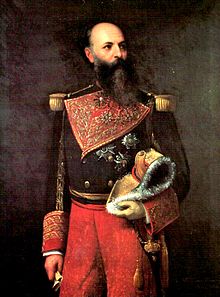Antonio Guzman Blanco
Antonio Guzmán Blanco (born February 20, 1829 in Caracas , † July 28, 1899 in Paris ) was a Venezuelan general and politician. He was President of Venezuela from 1870 to 1877, from 1879 to 1884 and from 1886 to 1887.
Life
The son of the politician and founder of the Partido Liberal , Antonio Leocadio Guzmán , studied law at the Universidad Central de Venezuela in Caracas until 1856 and was then in the diplomatic service in the USA. After his return in 1858, he was exiled to the Antilles by President Julian Castro . He joined General Juan Crisóstomo Falcón and Ezequiel Zamora in their invasion of Venezuela. After Falcon's defeat in 1860, he fled with this and was created to recruit support to the West Indies .
At the end of 1861 he landed again with Falcon in Venezuela. After a series of successful battles for Falcon, the fighting ended with the Treaty of Coche on May 22, 1863. A general assembly called in Victoria elected Falcon as president and Guzmán as vice president. Later Guzmán was also elected President of Congress.
After the removal of the Falcons by a conservative uprising under José Tadeo Monagas in 1868, Guzmán fled to Curaçao . At the beginning of 1870 he landed in Curamichate with his own troops and entered Caracas victoriously in April. For the next seven years he ruled Venezuela as president with dictatorial powers. (During this period, Congress awarded him the title Ilustre Americano, regenerador de Venezuela .)
After the victory of the Revolución Reivindicadota , Guzmán went to Paris, but became president again after the death of his successor Francisco Linares . Under the presidency of General Joaquín Crespo , he was Venezuelan ambassador to Paris before being re-elected president in 1886. In August 1887 he finally settled in Paris, where he died in 1899. In 1999 his remains were transferred to Venezuela.
Under Guzmán, a modernization of Venezuela based on the French model was initiated. Roads, railroad lines and aqueducts were built and the first telephones were installed. The Capitolio Federal (1873–77) and the Panteón Nacional were built on his orders . In 1881 he made the poem Gloria al bravo pueblo, set by Juan José Landaeta, the Venezuelan national anthem.
Web links
| personal data | |
|---|---|
| SURNAME | Guzmán Blanco, Antonio |
| BRIEF DESCRIPTION | Venezuelan general and president |
| DATE OF BIRTH | February 20, 1829 |
| PLACE OF BIRTH | Caracas |
| DATE OF DEATH | July 28, 1899 |
| Place of death | Paris |
